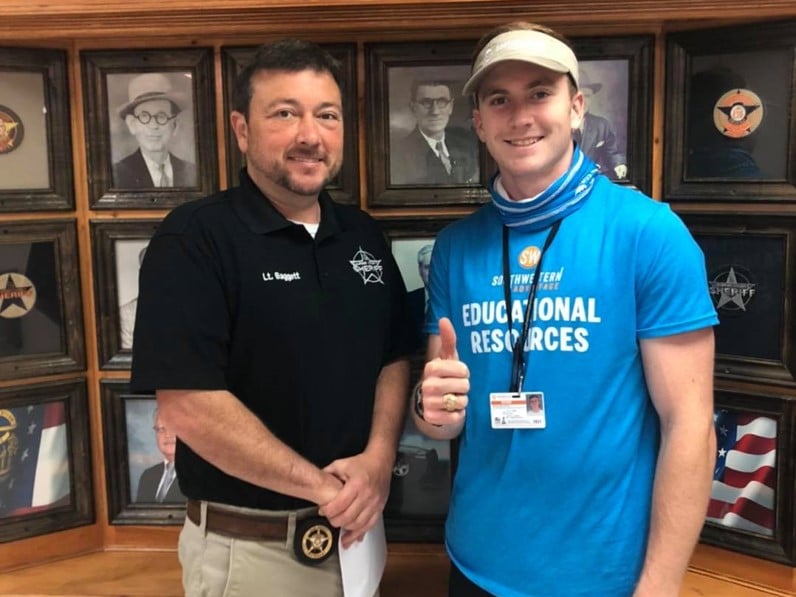For as long as there have been doors, there has likely been someone who knocked on them to make a sale. Door-to-door has long been a successful way to engage people face-to-face to share the value of a product offering – and it still is.
When summer approaches and door-to-door solicitors canvas communities throughout the US, various consumer advocacy groups release alerts for consumers for how to spot scams or protect themselves from being victimized at the door.
At Southwestern Advantage, we whole-heartedly support this. All bad actors who are utilizing the direct selling business model, marketing their products or services door-to-door, make it harder for the legitimate ones to grow with the seeds of skepticism and distrust having been planted.
What follows is a list of things the independent student dealers who participate in the Southwestern Advantage sales and leadership program do to protect the integrity of the preferred method of personal selling: door-to-door:
- Preparation: Each student has over 100 hours of training prior to starting their business that includes coaching that goes beyond the sales presentation. Included are courses on safety, integrity and ethics, how to use social media for their business, and tips for professionalism. Also, during the pandemic, extra precautionary training was put together that included social distancing, touchless selling, remote selling, temperature check and hand-washing, and appropriate apparel choices (masks, identifying clothing) while running their business.
- Follow all federal, state, and local laws: As it pertains to all laws, from paying taxes and obtaining solicitation permits to following traffic laws and the federal policies regarding direct selling business practices, the students who sell educational products to families work hard to stay within the guidelines afforded to them by the ruling governing bodies.
- A prepared introduction and approach to each home: students are asked to memorize a prepared introduction that states who they are and what they are doing. With all of the tools and information available (see below), there is no reason for anyone to question the legitimacy of what the student is doing.
- Business cards: Each student has business cards that contain their Facebook business page url for verification and company information if anyone in the community has a question about who the student is and what they are doing.
- Facebook Business Page: All students have a Facebook page dedicated to their business where they may share info about who they are, how to spot them in the community and what vehicle they drive. This is a great way for the students to post pictures with their customers and let others know what they are doing in the community. Students also post pictures with local law enforcement they have checking with prior to starting their business.
- Dual-sided photo ID badges: Students are provided with plastic ID badges so they may not only present themselves in a professional manner, but it allows the family to obtain information about the company. The badge has a lanyard that has the company’s website as well.
- Optional car magnets: Some students choose to put magnets on their car doors thatshare contact info and identify the company for which they represent in terms of the products they sell.
- Visitation to local authorities (police/sheriff): In addition to obtaining a solicitation permit if necessary, students are asked to pay a visit to local law enforcement in the area they will be selling. There is a leave-behind in which various information can be provided about the student and company.
- Live with local host families: Students become a part of the community they serve for the summer as they live in the community, pay local taxes, and even eat and shop locally. Living with host families helps cut down on expenses and provides a safe place for the students to stay and store their belongings.
- Distinction of representation: On the business cards, car magnets, and contract, it is clearly stated both the student and products are in no way affiliated with the local school district. The product is for use at home versus in the classroom.
- Customer service: Students have a contract with Southwestern Advantage to provideassistance with the clientele they have who purchase their products – specifically in regards to the three-day cooling off period for cancellations and questions regard the products.
- Dealer verification page: Each consumer cango to a webpage on the Southwestern Advantage site and enter the dealer’s first name, last name, or account number. It will pull up the student for the purpose of confirming their identity.
- Contract of Sale: Each sale is a legal contract between the student and consumer. It protects both, as it outlines the terms of the contract and cancellation policies (based on the Federal Cooling-Off Rule) and guarantees delivery of the product.
- Code of Conduct: Southwestern Advantage is a respected member of the community and state in which it is headquartered, as well as throughout all the many communities the students serve each summer. The company follows a code of conduct as a member of the Direct Selling Association and maintains an A+ rating with the Better Business Bureau.
Did you know? Southwestern Advantage has won many awards regarding the integrity of the program including the Better Business Bureau Torch Award for Ethical Commerce and the Charles F. Kettering Award for the top internship program in the nation by the Cooperative Education & Internship Association.





